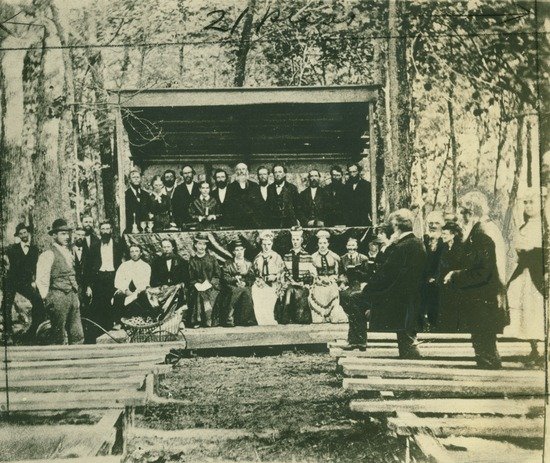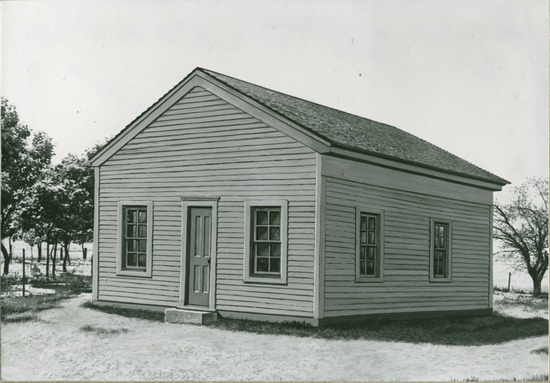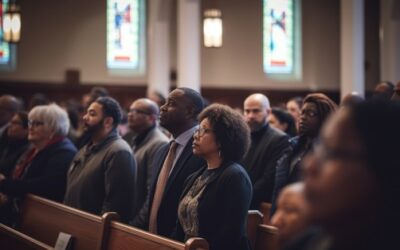Although camp meetings didn’t begin with the Seventh-day Adventist Church, they’re very common to Adventists.
Camp meeting is an extended event for Adventists (and non-Adventists) of all ages to gather and participate in spiritual seminars and activities. During the event, attendees often camp in tents, campers, or RVs.
Whether a weekend or ten days, the focus of the time is strengthening personal faith in Jesus and connecting the community of believers.
We’re going to dive into the following details:
- How camp meetings started
- What Adventist camp meetings are like today
- Why we still hold camp meetings
- Who can attend
- How to find a camp meeting near you
To begin, let’s take a brief tour of its history.
How camp meetings started

Courtesy of the Ellen G. White Estate, Inc.
The first camp meetings, as we know them today, started during a Presbyterian revival in Kentucky in the 1800s. At the time, another Protestant revival, the Second Great Awakening, was early underway.
The event was dubbed a “camp meeting” because the attendees camped out in their wagons and tents.
We don’t know how many attended, but at the same camp meeting the next year, between 20,000 and 30,000 people flocked to hear the preachers.1
The fervor quickly spread to other denominations, who began holding their own.
Adventists weren’t far behind.
Here’s how their camp meetings came about.
The first General Conference session had been held in 1868, but the people who attended came away disappointed at how business-like and dry it was. They had expected spiritual encouragement.2
James White, one of the founders of the Adventist Church, caught on to the sentiment. After some thinking, he suggested holding a “campmeeting,” an event that would be free from business and focus on spiritual matters.3
His plan was quickly put into action.
A couple months later, in September 1868, the first Adventist camp meeting took place in Wright, Michigan. It drew a crowd of over 2,000—among them James and Ellen White and J. N. Andrews. The meeting was so successful that they planned two more for that year in other states.4
Since then, Adventist camp meetings have become annual events around the world.
What an Adventist camp meeting is like today
Camp meetings today are in many ways similar to when they started. They’re generally held sometime between May and August. The programming still focuses on spiritual growth and revival. And many people still camp, too.
But unlike those of old, today’s participants don’t always stay in tents—they may bring an RV or camper, or rent a cabin. Many also stay in other people’s homes or in housing provided by the church.
Some meetings take place on school campuses, where camping isn’t always conducive. There, attendees might stay in dorm rooms and convene in a gym or auditorium instead of under big white tents.
Length
Although many meetings are still the traditional week in length, some are as long as nine days, and others are just a weekend or Sabbath convocation.
Cost
Camp meeting can be as inexpensive or as expensive as you want it to be. If you come just for the day and bring your own food, or stay at someone’s house, it’ll be free. But to eat at the cafeteria, have a campsite, or join certain workshops, you will most likely have to pay a fee to help cover costs.
Programs
 Another feature today is programs for different ages. Children can take part in classes geared for them, while adults can go to adult classes. But there is also time throughout the day for families to participate in events together.
Another feature today is programs for different ages. Children can take part in classes geared for them, while adults can go to adult classes. But there is also time throughout the day for families to participate in events together.
Let’s get a feel for what that might look like.
A typical camp meeting schedule
Every camp meeting will have its own variations in programming and time segments, but here’s a basic outline of a day:
- Prayer session. Rise and shine! This is generally the first event of the day and could be as early as 5:00 in the morning. Here, participants pray for each other and have a devotional time to kick off the day. However, this, as with every other event, is optional, so don’t worry if you’re not an early riser!
- Breakfast. Campers may cook their own, and usually, the cafeteria provides something for a fee.
- Activities and workshops. These activities focus on specific practical topics for Christians and are usually divided by age. They may last an hour or two. On Sabbath, this time slot is reserved for Sabbath School.
- Morning meeting. This event is typically two hours long and is divided by age to best suit the wide range of people. Classes are held for infants (0–2), kindergarteners (3–6), primary ages (7–9), juniors (10–12), earliteens (13–14), youth (15–18), and young adults (19+). Adults attend the main meeting and listen to a guest speaker. Over the years, these guest speakers have included well-known Adventists like Pastor Rei Kesis, Pastor Elizabeth Mokoro, Pastor David Mbaga. On Sabbath, this period is the main church service.
- Lunch. Once again, families may prepare their own midday meal or go to the cafeteria.
- Afternoon workshops. Like morning workshops, this section of the day could include many different activities for all age ranges.
- Afternoon meeting. Each age group will have its own activity or seminar for another hour or two.
- Supper and family time. This slot gives families the opportunity to spend some time together and catch up with friends.
- Evening meeting. One last event closes out the day. Sometimes, it’s a concert; sometimes, it’s a meeting like the others during the day. This usually ends by 9:00 pm or so.
Participants can pick and choose what activities and seminars they’d like to attend throughout the day to take advantage of the many benefits of the camp meeting program.
Why Adventists still hold camp meetings
The event serves many purposes, but the main one is to revive and enrich the spiritual lives of those who attend.5
Sometimes, the cares and frustrations and worries of life can seem overwhelming. But camp meeting offers a hiatus from all that to focus on what really matters: your spiritual life.6 It’s a time to rest and take in encouraging, wholesome thoughts.
But you might be thinking, I can do that at church or on my own. Why camp meeting?
Camp meeting isn’t just about individual spirituality. It’s also a huge community revival that connects the larger church body to encourage each other, build each other up, and learn together.
Friendship is a key aspect of that. At events like camp meeting, we have the chance to catch up with friends we don’t often see.
It also gives us a chance to reach out. You may run into people who aren’t Adventist—and maybe not even Christian. This is your opportunity to befriend and welcome them into the community, answering questions they might have along the way.
Who can attend camp meeting?
Anyone! All are welcome and encouraged to come, whether they attend an Adventist Church, another church, or no church at all.
Especially for those who are new to the Christian faith, camp meeting is a great way to meet Adventist Christians in a more casual setting. You don’t have to know, do, or be anything to learn about Jesus Christ and His love.
How to find a camp meeting near you
The best way to find your nearest yearly camp meeting is to ask your local pastor or someone else at your Adventist Church. You can also search online for ones in your state.
These are a few of the ones in the East-Central Africa Division of Seventh-day Adventists (ECD):
- Nairobi East Camp Meeting
- Kigali Camp meeting
- Kampala Camp Meeting
And if you can’t attend in person, some have livestream or video archives available.
Camp meeting has been part of Adventist culture for a long time. And though times have changed and we don’t camp in wagons anymore, one thing remains the same:
The need for humans to connect with Jesus and one another.
Camp meetings help meet that need.
If you’d like to learn about other Adventist ministries that bring people together,
- Spangler, J. R., “Workshops for Spiritual Revival,” Review and Herald, May 30, 1968. [↵]
- Poirier, Merle, “Camp Meeting,” Adventist Review.org. [↵]
- Ibid.[↵]
- Ibid. [↵]
- “Why Camp Meetings?” Ministry Magazine. [↵]
- Spangler, J. R., “Workshops for Spiritual Revival,” Review and Herald, May 30, 1968. [↵]
Related Articles
More Answers
What Does the Bible Say About Modesty
The Bible teaches that modesty, a form of humility and respect, is a valuable quality in everyone—men, women and children. It has to do with how we present ourselves, which should exemplify our inner relationship with God.
13th Sabbath Offering: What It Is and Why It Matters
On the last Sabbath of every quarter, Adventist churches participate in the 13th Sabbath offering—a special offering that goes to mission fields around the world.
Adventist Movies: Where Faith and Film Meet
The Seventh-day Adventist Church’s mission from the beginning has been to share God’s truth in the Bible. And as times have changed, we’ve explored new ways of doing this—one of those being movies.
Everything You Need to Know About an Adventist Church Potluck
Every so often, usually on a schedule ranging from once a week to once a month to once a quarter, an Adventist church will have “fellowship dinners,” often casually referred to as potlucks.
How to Join the Seventh-day Adventist Church
Whether you heard about the Seventh-day Adventist Church through a traveling evangelist, during your online searches, or through a loved one or relative, you might be considering joining yourself.
How Do Adventists Make Movie and Music Choices?
We have entertainment at our fingertips. With just a tap on our smartphones, we can access all the latest movies, music, YouTube videos, and more.
Do Adventists Celebrate Birthdays?
Yes, most Seventh-day Adventists do celebrate birthdays because we see them as excellent reminders of the life God has blessed us with. And we celebrate them the same way everyone else does—with friends, family, presents, and a special meal.
Are Seventh-day Adventists Christians?
Yes, the Seventh-day Adventist Church is a Protestant Christian denomination formed in 1863. Just like other Christians, we believe that Jesus Christ is our Savior and seek to follow the principles of the Word of God.
Do Seventh-day Adventists Believe in the Secret Rapture
The secret rapture belief asserts that the followers of Jesus will be suddenly and stealthily “raptured” from earth and taken to heaven. Then, any people left on earth will face a period of great difficulty—before Christ’s second coming actually happens.
The Seventh-day Adventist Hymnal
The Seventh-day Adventist Hymnal is a songbook used worldwide by many Adventist congregations during their worship services. Since its publication in 1985, it has helped foster praise to God while reminding church members of our mission and drawing them closer to Jesus.
Do Adventists Have Their Own Bible?
Adventists have some unique beliefs—you might be able to name some of them right now. The seventh-day Sabbath. Death as a sleep. Hell as nonexistence.
Do Adventists Celebrate Communion and Foot Washing?
Like many Christian denominations, Adventists regularly participate in communion, also referred to as the “Lord’s Supper” or the “Last Supper.” They also practice foot washing (John 13:1-20), or the “ordinance of humility,” during the service—which isn’t as common.
How do Adventists choose what to eat?
Every day, parents go through the ritual of getting their kids to eat what is healthy and good while trying to steer them away from what can hinder the growth of their developing bodies. Nutritionists work with their clients to make better food choices.
What Are Seventh-Day Adventist Sermons Like?
In nearly every Seventh-day Adventist Church, the sermon is the focal point of the main service—similar to many Protestant Christian denominations. It is a time of biblical instruction by the pastor, who shares what they’ve been studying in the Bible and preparing over the previous week.
Didn’t find your answer? Ask us!
We understand your concern of having questions but not knowing who to ask—we’ve felt it ourselves. When you’re ready to learn more about Adventists, send us a question! We know a thing or two about Adventists.
















